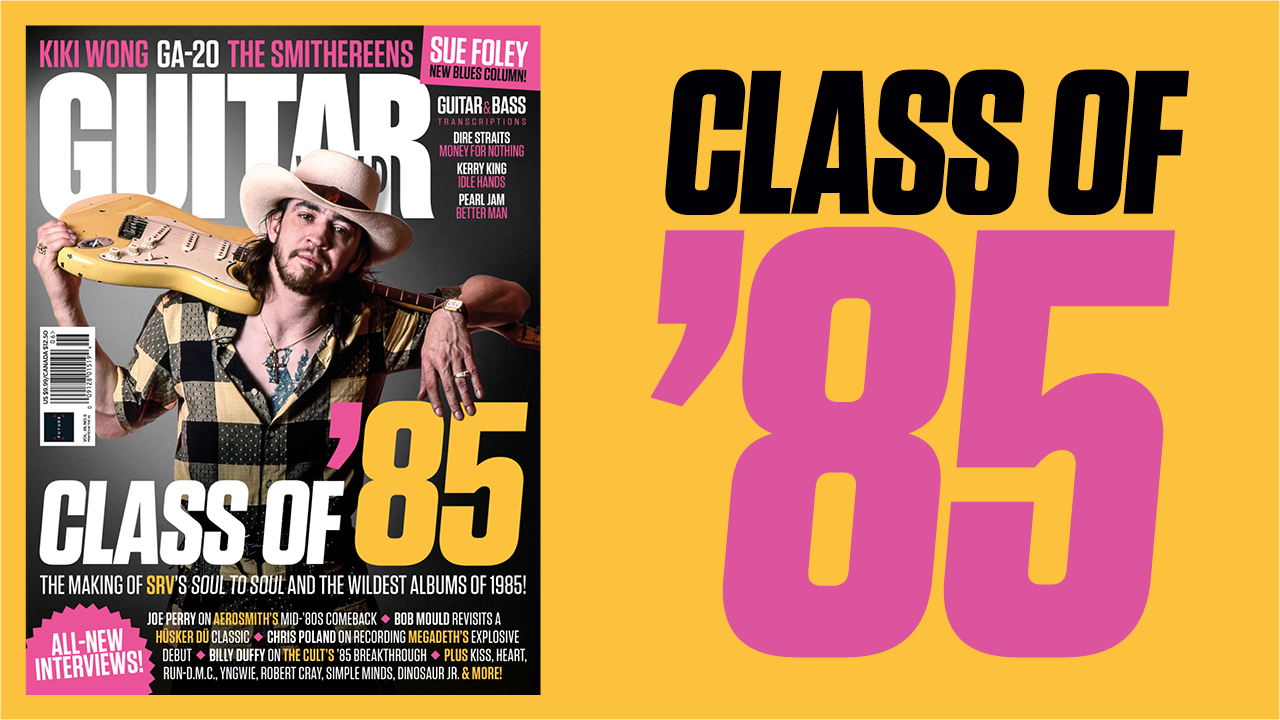The 50 greatest rhythm guitarists of all time
As voted for by you, here are the players who don’t necessarily need 16 bars and a spotlight solo to rubber-stamp their greatness
40. Chris Cornell
When you have a once-in-a-generation voice like Chris Cornell’s, the guitar is often an afterthought in any critical appreciation, but Cornell had the gift of presenting the familiar in a fresh context, as though his songwriting HQ was based deep somewhere in the uncanny valley.
Seriously, take a jam like Outshined, a song that slouches in a post-Sabbath groove, in drop D; in Cornell’s hands it sounds unorthodox and alien. Everything did. And sometimes it was, like on Rusty Cage, with drop B tuning and a wah pedal as a filter, and a time signature with a fear of commitment. Cornell proved you can play rhythm guitar and play with reality.
39. Les Paul
Les Paul’s name occasionally gets lost in association with Gibson’s classic single-cut electric guitar, so it is just as well that his recording career, particularly in the company of Mary Ford, provided an abundance of evidence of his greatness. He was fluent in blues, country and jazz, and had a rhythm guitar style that had such flair and timing it would shame Fred Astaire.
There’s a liquid quality to Les Paul’s playing, as though the guitar somehow came easy to him. Maybe it did. But everyone on this site knows that making the instrument sing like a canary is no gimme. His multi-tracking only added to the fun, a force multiplier for his virtuoso swing comping, and even when he played a solo the rhythm’s umbilical cord was never severed.
38. Nancy Wilson
Nancy Wilson started playing the guitar aged nine and brought to Heart an acoustic sensibility that she intuitively knew how to electrify. Take Crazy On You, from their 1975 debut, Dreamboat Annie, a fleet-fingered skedaddle through an A minor Paul Simon-inspired acoustic folk piece she calls Silver Wheels that builds to a strum and establishes a song that would never leave rock radio’s rotation.
Speaking to GW just after the release of her 2021 solo album, You and Me, and her signature Epiphone Fanatic, she explained how the instrument helped guide her approach.
“If you could make an analogy, I'd be more of a Neil Young as an acoustic guitar player and a Pete Townshend as an electric player,” she says. They would be honored by the comparison.
Get The Pick Newsletter
All the latest guitar news, interviews, lessons, reviews, deals and more, direct to your inbox!
37. Django Reinhardt
Django Reinhardt played loud, hard and with conviction and swing, and after the injuries sustained in a fire restricted the movement on his fretting hand, he adapted and pressed on with a hybrid gypsy jazz approach that showcased a superhuman level of dynamics and picking styles, and an improvisational brio of someone who mastered his craft playing with and for people.
The legend of Reinhardt and his recovery from the fire extends far beyond jazz. Arguably, if there was no Reinhardt, there’d be no heavy metal, and Tony Iommi would have been lost to music after an industrial accident.
36. Mike Campbell and Tom Petty
The Heartbreakers make it on this list as a twofer, presumably because no-one can choose between them, or to have one without the other would feel incomplete, maybe even inappropriate. Does this democratic quirk nonetheless reveal an unspoken truth in rock ’n’ roll, that the band with two rhythm guitarists is always better than those with one?
Quite possibly. That said, across the Heartbreakers’ catalog – most notably Runnin’ Down a Dream – Campbell is similarly talented playing leads. But these two soundtracked many an American adolescence with the 12-string jangle of The Waiting, with the super-groove riffs of Nightwatchman, and the drive-time rock of Refugee. They still do. Nothing is too showy. When the songs are this strong, it doesn’t need to be.
35. Cory Wong
What can we say about Cory Wong that could do justice to his funk rhythm chops? Or to his phrasing and chord choice, and how it is at once part of the musical background and foreground? Well, let us borrow the words of guitar god Steve Vai, who recently explained to us how players like Wong are a rare and special breed.
“There’s few cream-of-the-crop guitar players who play rhythm that own the groove,” says Vai. “They own it – meaning they can play ahead of the groove, behind the groove. They can divide the groove in a relatively unconventional kind of a groove, and own it, and make you feel it while they’re doing it. And I love that about Cory. He owns it.”
34. Johnny Marr
Johnny Marr’s style is unorthodox in the extreme and profoundly influential. Even a track such as This Charming Man, by now a pop-cultural fixture, is unequivocally revolutionary, with Marr giving the intro a steel-pan calypso vibe. Marr will often blur boundaries between what we’d call rhythm and what we’d call lead, playing a carnival riot of arpeggios with a clean tone jangle, and a canny ear for tone.
He took electric guitar out of its comfort zone. He was among a cohort who assumed an anti-rock sensibility that allowed them to innovate, subverting clean tone orthodoxy for an altogether more heady sound.
33. Rudolf Schenker
Rudolf Schenker is the driving force of the Scorpions and what a driving force he is – a veritable rhythm guitar dynamo. He is the pistons and steel behind the German rock legends’ sound, the 100 percenter, the showman.
Rock rhythm guitar requires an up-and-at-‘em attitude. A Gibson Flying V helps, too. But that alone will not get the job done; you need riffs. The Scorpions have heaps of them, big powerchords played hard, action-movie headbangers, hard-rockers with a locomotive momentum (all but meta-referenced in Catch Your Train).
32. Jerry Cantrell
You can hear Jerry Cantrell’s influences in his playing: the heft and scope of ‘70s rock, the fatalism of Black Sabbath, and a melodic sensibility that might have come from the dark side of the Beatles, or Sir Elton John.
Most of all you hear Jerry Cantrell, who knows just how to position his audience just where he wants them: right out there on the edge with the chromatic 7/8 pummel of Them Bones' verse; in a state of awe on We Die Young, or just plain lost in the three-dimensional textures of his playing, and that uncanny drone that calls our consciousness to attention, and so often holds the songwriting together.
31. Paul Stanley
The ultimate Friday night guitar player from the ultimate Friday night band, Kiss’s Paul Stanley has helped build a multinational entertainment corporation out of a solid understanding of the principles of hard rock song-craft. He was raised on a diet of Motown and Philly soul, Elvis and Beethoven, and the Beatles, of course… The talent is putting all that together.
No question, Stanley’s writing is blockbuster – take Lick It Up, Do You Love Me and Room Service, for example – and a lot of that is recognizing that songwriting is working out how to get from A to B.
In another life, he could be a New York cabbie. In this one, it’s in taking riffs and melodies and writing a chorus so good you just have to write a check and go buy some pyro.
Jonathan Horsley has been writing about guitars since 2005, playing them since 1990, and regularly contributes to publications including Guitar World, MusicRadar and Total Guitar. He uses Jazz III nylon picks, 10s during the week, 9s at the weekend, and shamefully still struggles with rhythm figure one of Van Halen’s Panama.
“My guitar tech ran in and said, ‘Hey, you want to meet Pete?’ I was too scared”: The Smithereens’ love affair with The Who goes way back – yet when guitarist Jim Babjak got the chance to meet Pete Townshend, he turned it down
“Every tour was the best I could have done. It was only after that I would listen to more Grateful Dead and realize I hadn’t come close”: John Mayer and Bob Weir reflect on 10 years of Dead & Company – and why the Sphere forced them to reassess everything








![John Mayer and Bob Weir [left] of Dead & Company photographed against a grey background. Mayer wears a blue overshirt and has his signature Silver Sky on his shoulder. Weir wears grey and a bolo tie.](https://cdn.mos.cms.futurecdn.net/C6niSAybzVCHoYcpJ8ZZgE.jpg)

![A black-and-white action shot of Sergeant Thunderhoof perform live: [from left] Mark Sayer, Dan Flitcroft, Jim Camp and Josh Gallop](https://cdn.mos.cms.futurecdn.net/am3UhJbsxAE239XRRZ8zC8.jpg)






